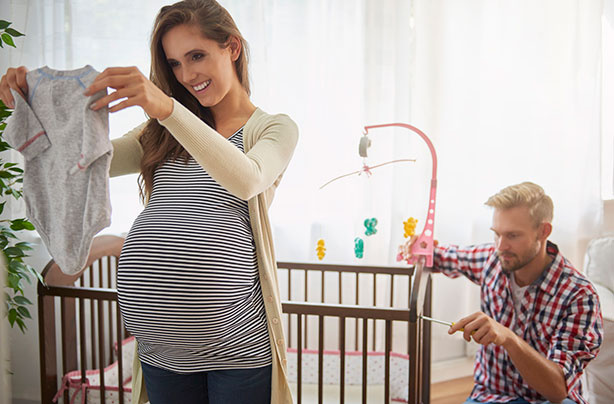Family benefits: From child tax credits to free school meals
Working out which benefits you're entitled can feel like a minefield. To help you, we've outlined the main family-related benefits to make it easier to know what you can claim

With so many possible childcare options available, working out which benefits you're entitled is an important place to start. To help you, we've outlined the main family-related benefits to make it easier to know what you can claim when you're pregnant, when you have children and even what your kids can claim on their own.
If you already claim any benefits, you'll probably know it's not clear-cut, and some benefits depend on personal circumstances which include low income, being a single parent or having a disabled child.

Benefits when you're pregnant
Statutory Maternity Pay (SMP)
How do I qualify? You need to have worked for the same employer for at least 26 weeks (by the time you're 15 weeks away from your baby's due date). It doesn't matter how many hours you work as long as you earn more than £112 a week.
How do I get it? This non means-tested payment is paid by your employer at the same time as your wages. (They then claim the money back from the government). You don't have to pay back SMP if you don't go back to work and you might get more than this legal minimum depending on your employment contract. You need to show your employer the medical certificate (MATB1) which is provided by your doctor or midwife 20 weeks (no earlier) before your baby is due
How much can I get? You'll get 90% of your normal gross (before tax) weekly pay for the first 6 weeks of maternity leave and £139.58 or 90% of pay for the rest of maternity leave (whichever is less). SMP is paid for 39 weeks.
Maternity Allowance
How do I qualify? This is for women who are pregnant or who've recently had a baby but who don't qualify for SMP because they stopped work, don't work enough or are self-employed. You need to have been employed or self-employed for 26 weeks of the 'test period' (66 weeks up to and including the week your baby's due) but it doesn't matter if the weeks are split or if you've worked for different employers. You do need to have earned £30 a week average over any 13 weeks in this time.
How do I get it? Call Jobcentre Plus for a claim form on 0800 055 6688 or print one off online. You can claim any time from being 26 weeks pregnant and it's usually paid into your bank account. You'll need your national insurance number and identification e.g. driving licence or birth certificate as well as an SMP1 form from your employer, proof of wages and confirmation of your pregnancy (usually the maternity certificate from your doctor or midwife MATB1).
GoodtoKnow Newsletter
Parenting advice, hot topics, best buys and family finance tips delivered straight to your inbox.
How much can I get? You can get £139.58 a week or 90% of your average weekly earnings (whichever is less) for up to 39 weeks or £27 a week for up to 14 weeks. You might get less if you've not paid enough National Insurance contributions.This will be paid to you every 2 or 4 weeks.
Free healthcare
How do I qualify? If you're pregnant or have had a baby in the last 12 months, you're entitled to free NHS prescriptions as well as free NHS dental treatments (including check-ups) during this time. If you work, all pregnant workers are paid time off for antenatal care as long as you've told your employer you're pregnant. Legally, you must tell them you're pregnant at least 15 weeks before the start of the week of your due date, but it's better if you can tell them before that as they have a legal duty to protect your health and safety during pregnancy
How do I get it? You need to present a valid maternity exemption certificate or card (MatEx) which you can do by filling out the maternity exemption certificate (form FW8) from your midwife, GP or health visitor who will sign the form. The certificate is valid from 1 month before the date the application is received until 12 months after the expected due date (or if your baby has already been born, 12 months after the date of birth).
How much can I get? All treatment is free. If you need to pay for prescriptions before you receive your certificate, you might be able to get a refund, so ask your pharmacist for an official NHS receipt (form FP57 in England or WP57 in Wales).
Healthy Start
How do I qualify? You must be at least 10 weeks pregnant or have a child under 4 years old AND you or your family get Income Support, or Income-based Jobseeker's Allowance, or Income-related Employment and Support Allowance, or Child Tax Credit and your annual family income is £16,190 or less (2014/15). You also qualify if you're under 18 and pregnant, even if you don't get other benefits or tax credits.
How do I get it? You can apply using the online form at healthystart.nhs.uk or via email on the website.
How much can I get? This scheme provides vouchers which can be used to buy milk, fruit and vegetables, infant formula and vitamin supplements. Pregnant women receive one voucher each week (£3.10). For babies under 1 year old, you get 2 vouchers each week (£6.20) and for children aged 1-4, you get one voucher a week (£3.10).
Statutory Adoption Pay (SAP)
How do I qualify? This is for anyone who's been matched with a child by an adoption agency and is taking adoption leave. You need to have been working for your present employer without a break for at least 26 weeks up to and including the week the adoption agency told you that you'd been matched with a child for adoption. You must also be earning an average of at least £112 a week (before tax)in an 8 week period.
How do I get it? SAP is administered by your employer. You need to tell them you want to take adoption leave no more than 7 days after you've been notified that you've been matched with a child for adoption, or as soon as is practical. You also need to tell them when the child will be with you and the date your want your leave and SAP to begin.
How much can I get? You can get 90% of your gross average weekly earnings for the first 6 weeks and then £139.58 a week or 90% of their gross average weekly earnings (whichever is lower) for the next 33 weeks. Be careful to remember that tax and National Insurance will need to be deducted.

Benefits when you've got a new baby
Sure Start Maternity Grant
How do I qualify? You're eligible if the new baby is the only child in the household who's under 16 and you or your partner already claim certain benefits such as Income Support, Income-related Employment and Support Allowance, Income-based Jobseeker's Allowance or the guarantee part of Pension Credit. You can also apply for it for other reasons including adoption - get the full list here.
How do I get it? Contact your local Jobcentre Plus Office for a claim form (in Northern Ireland, contact your local Social Security/Jobs and Benefits Office). You can claim from the 11th week before the baby's due and up to 3 months after. The money is usually paid directly into your bank account. You need to get the certificate on the back of the claims form signed by a midwife, health visitor or doctor.
How much can I get? The Sure Start Maternity Grant is a one-off payment for £500 to help with the costs of a newborn or adopted baby. This payment will go straight into your bank account.
Statutory Paternity Pay (SPP)
How do I qualify? This non means-tested benefit is for working fathers or partners of a woman having a baby. You have to work for the same employer for 26 weeks by the time the baby is 15 weeks away from its due date. You also have to continue to work for that employer without a break up to the date of birth (or the date the child is placed with you for adoption) and you need to be earning at least £112 a week (before tax).
How do I get it? It's administered by employers and paid in the same way and at the same time as your normal wages. Leave can't start before the birth. The start date must be on the actual date of birth, an agreed number of days after the birth or an agreed number of days after the expected week of childbirth. Leave must finish within 56 days of the birth (or due date if the baby is early).
How much can I get? You can claim for 1 or 2 weeks during your paternity leave. The amount you get is £139.58 or 90% of your average weekly earnings (whichever is less).

Benefits when you've got children
Child benefit
How do I qualify? This is a tax-free, non means-tested weekly payment for anyone responsible for a child under 16, or who is under 20 and in full-time, non-advanced education (which means up to A-Level or NVQ Level 3). You can claim as soon as your child is born, a child you're responsible for comes to live with you or you adopt a child. You don't need to have paid National Insurance to claim it.Only one person can claim.
How do I get it? You need to complete a Child Benefit claim. It's in the Bounty Pack given to new mums in hospital or you can download the form from hmrc.gov.uk and send it to the Child Benefit Office with the child's original birth or adoption certificate (which is then sent back to you). It can take up to 12 weeks for a new Child Benefit Claim to be processed.
How much can I get? You can claim the highest rate for your oldest child at £20.70 a week and £13.70 a week for other children. It's usually paid every 4 weeks on a Monday or Tuesday.
Child Tax Credits
How do I qualify? You're eligible for child tax credits if you're responsible for a child under 16 or someone under 20 who is in full-time non-advanced education (up to A-Level or NVQ level 3. You don't need to be working to claim and you can get money for each child that qualifies.
How do I get it? You can get a tax credits claim pack by using the online tool or calling the Tax Credits Office on 0345 300 3900 and asking for one to be posted for you. It can take up to two weeks for your form to come. You can put in your claim for Child Tax at any time of the year, but only one adult from each household may do this and it needs to be renewed every year. It might take up to 5 weeks for a claim to be processed so be sure to give yourself some time.
How much can I get? This payment is one of the more complicated to work out.How much you get depends on things like your income and circumstances, for example if your child is disabled.You could get a basic amount of up to £545 a year. This is known as the 'family element'. From 6 April 2017, you will only get the family element of Child Tax Credit if you're responsible for a child or children born before that date. Depending on your situation you could get extra 'elements' for each child, of up to £2,780.
Childcare vouchers
How do I qualify? If you're working and pay for childcare, your employer may be able to help with childcare costs via vouchers. This is usually in return for a pay reduction, known as 'salary sacrifice'. If your employer doesn't offer vouchers, it's worth seeing if you would benefit from them, then asking your employer if they would consider offering them. It's a good idea to look into this in advance as it can take time to set up.
How do I get it? Your employer may give you paper or electronic vouchers or they might ask a childcare voucher provider to arrange this. You don't have to use them that week or month e.g. you may need more childcare during the school holidays so you can save them up. Check that the childcare provider you want to use accepts vouchers. Note that if you get vouchers, it can affect the amount of tax credits you get. HMRC have a handy online calculator to help you work out if you're better off with or without vouchers. You'll need to know things like income for the last and current tax year and total childcare costs. A full list is available at hmrc.gov.uk.
How much can I get? If you're earning a 'Basic Rate' which is between £43,000 you can save up to £243 a month equalling £933 a year.
If you're earning a 'Higher Rate' which is between £43,001-£150,000 you can save up to £124 a month equalling £623 a year.
If you're earning an 'Additional Rate' which is above £150,000 you can save up to £110 a month or £623 a year.
Disability Living Allowance
How do I qualify? This tax-free benefit is for disabled children and adults to help with extra costs. For children under 16, it is claimed by the child's parent as the child's appointee (i.e. acting for them).
How do I get it? Call the Benefit Enquiry Line on 0800 88 22 00 or textphone 0800 24 33 55 or download the claim form for under 16s at dwp.gov.uk. It's worth noting that when a child receiving DLA turns 16, they can take over their own claim or keep the parental appointee. It doesn't matter if they've left school or not.
How much can I get? It depends on individual circumstances and includes a care component (if they need help looking after themselves or help to stay safe) from £20.05 to £77.45 a week. It also includes a mobility component if they can't walk or need help getting around (£20.05 - £54.05 a week). Some people get one, some get both, and they are paid at different rates.
Guardian's Allowance
How do I qualify? You're eligible for this if you look after a child that is not your own (biologically or by adoption) and their parents have either both died or one has and the remaining parent is unable to look after them. You can only get Guardian's Allowance if you also get Child Benefit for the child.
How do I get it? Fill in a claims form and send it to the Guardians Allowance Unit with the child's birth certificate and the parent's death certificates. Forms can be back dated for up to 3 months.
How much can I get? Guardian's Allowance provides £15.55 each week for each child.
Income Support
How do I qualify?
If you're a lone parent, you're not in full-time employment and you have children under 5 or a child under 20 with a temporary illness, you could be eligible.
How do I get it? The quickest way to apply for Income Support is by phone, you can call Jobcentre Plus on 0800 055 6688 to put in a claim.
How much can I get? It's very complicated to work out Income Support as it takes into account your income, your age, who you live with, if you have any savings and many other factors, but if you qualify you should get at least £57.90 a week.
Free school meals
How do I qualify? If you're on certain benefits such as Income-based Jobseeker's Allowance, Income Support, Income-related Employment and Support Allowance, Child Tax Credit and some others, schools must provide a free midday meal to your children.
How do I get it? You need to contact your local council as each one will have its own application form to complete.
How much can I get? You usually get vouchers to pay for free meals - these may or may not be the same meals that those paying in full get. You may also be eligible for free milk at school. The value of the vouchers depends on the local council.
Benefits children can claim
Most young people can't claim any benefits in their name until they turn 18, but it's worth checking if your kids are eligible for the following.
Employment and Support Allowance (ESA)
How do I qualify? Some young people might be able to claim ESA from the age of 16 if they can't work because of illness or disability. But if they do, the parent's child benefit stops. It involves a medical assessment called the Work Capability Assessment which assesses what health-related support you might need.
How do I get it? You can claim ESA by telephone (0800 055 6688), textphone (0800 023 4888) or by downloading a claim form from direct.gov.uk. If you do it by telephone/textphone, someone goes through the form with you and fills it in.
How much can I get?
For the first 13 weeks after you claim you will probably get the assessment rate which is £57.90 a week. From there you will be placed into either the work-related activity group of £102.15 a week or the support group of £109.30 a week.
16-19 bursary fund
How do I qualify? Anyone aged 16-19 who thinks they might have problems paying for education or training may be eligible for a bursary. This usually means a young person in care, care leavers (those who were in care but have now left), young person on Income Support in their own name or a disabled young person receiving both Employment Support Allowance and Disability Living Allowance in their own name. Other students facing financial problems might be eligible too - check with the school or college.
How do I get it? School, colleges and training providers award the bursaries and each one has its own application process.
How much can I get? If a child falls into one of the groups mentioned above, the bursary is £1200 a year (less for part-time courses or courses under 30 weeks). Other students in financial difficulties will have their amount set by the college.
Carer's Allowance
How do I qualify? A young person can claim Carers Allowance as soon as they are 16, as long as they've left full-time education and do not earn more that £110 a week. The person you're caring for must be already supported by one the benefits set out in the eligibility guidelines and you must spend at least 35 hours a week caring for them.
How do I get it? You can apply online and need to have your National Insurance number, bank details and date of birth of the person your caring for to hand.
How much can I get? You could get up to £62.10 a week which can be paid into your bank account weekly, monthly, or quarterly depending on your preference.
Trusted, informative, and empathetic – GoodToKnow is the ultimate online destination for parents. At GoodtoKnow, our mission is 'simple': we're trying to make sense of parenthood. On the site, you'll find everything you need for a happy, healthy family life. Our huge archive of content includes more than 18,000 articles and 1,500 how-to videos. These include expert-backed advice features on parenting, dealing with relationship changes after having a baby, self-care for mums and managing your family finances. We also feature tried-and-tested product reviews and buying recommendations for every stage of family life - from prams and Moses baskets to birthday gifts and top toys.